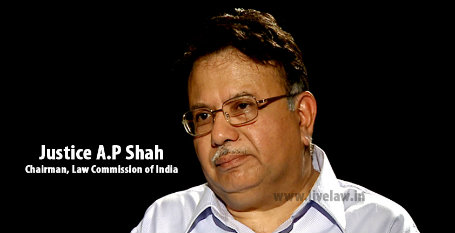Section 377 is discriminatory, unreasonable and violates individual privacy and human dignity, said Law Commission Chairman Justice AP Shah.
The head of India’s law commission has publically criticized the country’s anti-gay Section 377 law as discriminatory and psychologically damaging for gay people.
"Section 377 is discriminatory in its application, unreasonable in its intent, deprives a group of its personal autonomy and violates individual privacy and human dignity,” said Law Commission Chairman Justice AP Shah on Feb. 16, according to the Press Trust of India.
The major function of the Law Commission, an executive body established by the Government of India, is to work for legal reform.
"Consequences of the laws in our country on gay sex include damage to the psychological well being of homosexuals, encouragement of violence and facilitation of police harassment and discrimination against the LGBT community," said Shah while speaking at the book launch of 'Sexual orientation and Gender Identity' by Justice Michael Kirby, former judge of the High Court of Australia.
The book is based on a series of lectures Kirby gave in 2013 on LGBT rights at Calcutta University in eastern India.
Talking through a video message Kirby said LGBT rights is akin to “the advancement of universal and fundamental human rights” and hoped that his book might “sensitize the country and help towards a better future to the LGBT community."
Another Indian jurist at the book launch also condemned the Supreme Court for recriminalizing consensual same-sex relations by reinstating the Section 377 law in December 2013, reversing the 2009 Delhi’s high court ruling that decriminalized it and gave the gay community broad protections and rights. Currently, a new Supreme Court bench has agreed to re-examine that decision.
"Sexual minorities have been looking for some support from the judiciary but it hasn't been forthcoming," said Fali Sam Nariman, a distinguished Indian Constitutional jurist and senior advocate to the Supreme Court of India since 1971 and President of the Bar Association of India since 1991.
Gay rights activists and organizations in India had filed a “curative petition” requesting the Supreme Court it to correct its earlier verdict that upheld a colonial era “Section 377” law that described same-sex relations as “unnatural” and a crime punishable by up to life imprisonment.
A curative petition is the last option available to a litigant after exhausting all the appeals and dismissal of a review petition and is generally not heard in open courts.
That decision will affect at least 40-60 million LGBT people in India even though anecdotal suggestion shows that one in 10 people are LGBT, making the community around 120 million people in India.
The Supreme Court past April ruled recognising transgender people as the third sex and said that Section 377 was not to be used against transgender people although it was to be still applicable to gays, lesbians and bisexuals.
The head of India’s law commission has publically criticized the country’s anti-gay Section 377 law as discriminatory and psychologically damaging for gay people.
"Section 377 is discriminatory in its application, unreasonable in its intent, deprives a group of its personal autonomy and violates individual privacy and human dignity,” said Law Commission Chairman Justice AP Shah on Feb. 16, according to the Press Trust of India.
The major function of the Law Commission, an executive body established by the Government of India, is to work for legal reform.
"Consequences of the laws in our country on gay sex include damage to the psychological well being of homosexuals, encouragement of violence and facilitation of police harassment and discrimination against the LGBT community," said Shah while speaking at the book launch of 'Sexual orientation and Gender Identity' by Justice Michael Kirby, former judge of the High Court of Australia.
The book is based on a series of lectures Kirby gave in 2013 on LGBT rights at Calcutta University in eastern India.
Talking through a video message Kirby said LGBT rights is akin to “the advancement of universal and fundamental human rights” and hoped that his book might “sensitize the country and help towards a better future to the LGBT community."
Another Indian jurist at the book launch also condemned the Supreme Court for recriminalizing consensual same-sex relations by reinstating the Section 377 law in December 2013, reversing the 2009 Delhi’s high court ruling that decriminalized it and gave the gay community broad protections and rights. Currently, a new Supreme Court bench has agreed to re-examine that decision.
"Sexual minorities have been looking for some support from the judiciary but it hasn't been forthcoming," said Fali Sam Nariman, a distinguished Indian Constitutional jurist and senior advocate to the Supreme Court of India since 1971 and President of the Bar Association of India since 1991.
Gay rights activists and organizations in India had filed a “curative petition” requesting the Supreme Court it to correct its earlier verdict that upheld a colonial era “Section 377” law that described same-sex relations as “unnatural” and a crime punishable by up to life imprisonment.
A curative petition is the last option available to a litigant after exhausting all the appeals and dismissal of a review petition and is generally not heard in open courts.
That decision will affect at least 40-60 million LGBT people in India even though anecdotal suggestion shows that one in 10 people are LGBT, making the community around 120 million people in India.
The Supreme Court past April ruled recognising transgender people as the third sex and said that Section 377 was not to be used against transgender people although it was to be still applicable to gays, lesbians and bisexuals.












 打印版本
打印版本

















读者回应
Hello my dear,
i am happy to contact you after
viewing your profile and it interest
me to contact you for a genuine relationship,
please contact me here(nicolemakuza1992@hotmail.com)
so that i will share my feelings with
you for further communication.
Thanks, your friend Nicole.
(nicolemakuza1992@hotmail.com)
请先登入再使用此功能。